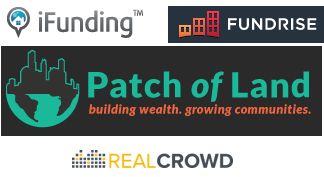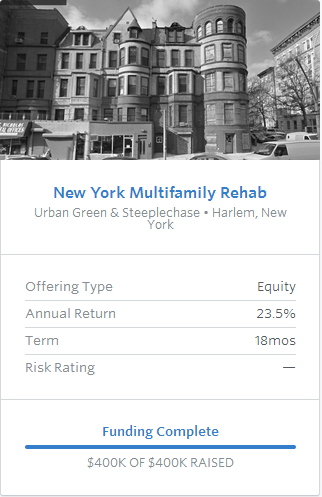Real Estate Investing through Crowdfunding
. Posted in financials - 7 Comments
Real estate investing is appealing for many reasons. Rentals produce cash flow, don't correlate with the stock market, and tend to be predictable. Now, thanks to the Jumpstart Our Business Startups Act of 2012, there's a new way to invest in real estate. It's called crowdfunding, and it offers a middle ground between operating your own property and investing in a real estate investment trust (REIT). Unlike operating your own property, a crowdfunded investment doesn't require you to put up 100% of the capital to purchase a building. Also, someone else manages it. And unlike a REIT, you select the properties in which you want to invest.

Logos of various crowdfunding companies.
How does Crowdfunding Work?
Crowdfunding collects capital from many investors and combines it into large projects. Generally, these projects are larger than any individual would attempt on their own.
Unlike the stock market, which includes only public companies, crowdfunding invests in private companies. The rules for private reporting are less strict than those for public reporting. This means that investors in private companies must be more careful and do more analysis on their own.
For this reason, crowdfunding is currently allowed only if you are an accredited investor.
Am I an Accredited Investor?
The quick test is two-parts. If you answer "yes" to either one, you pass:
- Is your net worth at least one million dollars? (Include the net worth of your spouse. Don't count the value of the space in which you live.) OR
- Was your gross income at least $200,000 per year for the last two years (or $300,000 including your spouse)? Do you expect that to continue?
For the full legal definition, visit the SEC's page on accreditation. They're working on changing the rules to let unaccredited investors crowdfund, as well, but for now, that's the threshold.
The thinking is that if you're accredited, you'll be able to dig yourself out of a bad investment without going onto welfare.
Is this the same as Kickstarter?
You may have heard of websites like kickstarter, where "backers" give money in exchange for recognition or a product. Sometimes that's also called crowdfunding, but kickstarter is very different because "backers" don't become owners of the company. They only get the recognition or the product. In real estate crowdfunding, backers become shareholders or partners in the new venture.
How Should I think about Real Estate Investing through Crowdfunding?
Think about it the same way you would any real estate investment. Will the underlying property succeed? Does a conservative estimate of rent still look high enough? Is enough money being raised to make the needed renovations? Will there be a mortgage? What are the mortgage payments, taxes, and insurance going to be?

RealCrowd.com offers this $25,000 minimum investment opportunity to own part of a skyscraper in Washington state
Management is a Special Concern in Crowdfunded Investments
Here's another crucial difference between crowdfunding and buying on your own. When you own the property by yourself, you can hire or fire management as needed. But with crowdfunding, all you can do is evaluate the managers before you sign on the dotted line. You would have a very hard time firing them or replacing them if they start doing a bad job. You would have to collect votes from all the other shareholders, partners, or the board of directors to remove a bad manager.
It might make sense therefore to spread your investment around. Suppose you have $500,000 and you'd like to start building a commercial portfolio. Rather than investing all of that in a single building, you could make ten investments of $50,000 each. Each investment would be in a different building, in a different location, and under different management. That way if any one of those buildings experiences a total disaster, you still have nine others.
How Many People Are Participating?
According to Wall Street Journal calculations, approximately $135 million has been invested in real estate via crowdfunding. That shows that lots of people are participating. It also shows extreme newness. The total value of US housing alone, never mind commercial property, is $25 trillion (according to Google). So, crowdfunding has barely scratched the surface of what it might someday do.
The same Wall Street Journal article cites properties that have sold for as little as $100. So it's just like the larger market. You will find a spectrum of investment properties from "turnkey" to "evict and gut".
Can I See a Property Before I Invest?
Sort-of. Unless you travel frequently or can travel for the purpose of investing, you won't see the property in person. But you could use Google Street View to get a glimpse of the neighborhood. Many listings provide pictures.
Over time we'll probably see a less glossy presentation for these properties and more realism. Extensive picture and video revelations will be demanded by savvy investors who normally crawl around in the basement before they buy.
Learn More at Actual Crowdfunding Sites
Here's a list of crowdfunding sites:
- iFunding.co
- Commercial Retail and Single Family Residential
- RealCrowd
- Multifamily, retail, office, industrial, development, and funds
- Patch of Land
- Residential flips, and commercial rentals with 3 to 5 year time horizon
- FundRise
- Mixed use

A project in New York City recently funded, promising a 23.5% annual return (very precise!)
- Realty Mogul
- Cash flow and pooled loans
- CrowdStreet
- Multifamily, retail, office, industrial, land, structured investment funds
What do you think? Would you make a crowdfunded project your next investment?
Leave a comment below.




